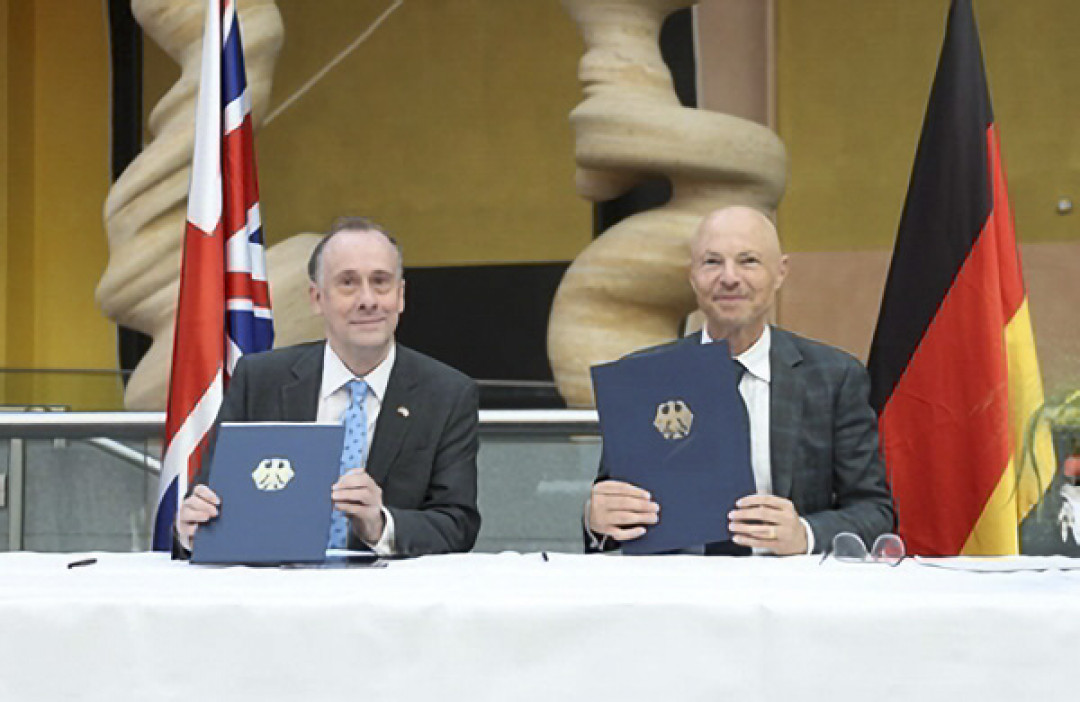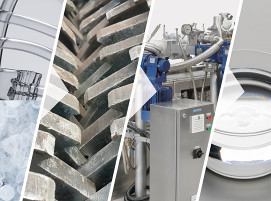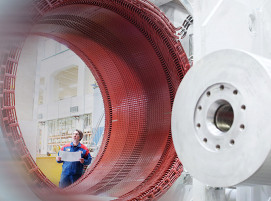
UK and Germany Partner to Advance Hydrogen Developments
A new important agreement between the UK and Germany could help accelerate the development of an international hydrogen industry – with the two countries at the cutting edge of its development. Signed at the end of September at the UK Embassy in Berlin, by Minister for Energy Efficiency and Green Finance Lord Callanan and Federal Republic of Germany’s State Secretary for Energy Philip Nimmermann - a Joint Declaration of Intent will see the UK and Germany work together to underpin the international trade in hydrogen.
The 2 governments will also accelerate the role of low-carbon hydrogen in their nations’ energy mix, showing the world how to expand new, net zero-friendly markets. They committed to work together to further advance ground-breaking and renewable hydrogen technologies, supporting jobs and low-carbon investment. The partnership follows significant investment by both countries in the development of hydrogen as an alternative fuel. In the UK, the government is supporting new low-carbon hydrogen production with capital from the £240 million Net Zero Hydrogen Fund and revenue support from the Hydrogen Production Business Model. In Germany, the government is also supporting the implementation of the National Hydrogen Strategy with funding from the Climate and Transformation Fund, providing a push for the ramp-up of a hydrogen market. It will also further boost the move towards net zero emissions by 2050, and the energy security of both countries, moving away from fossil fuels and towards cleaner and more secure, diversified alternatives.
UK’s Minister for Energy Efficiency and Green Finance Lord Callanan said: "The UK and Germany are natural partners in making low-carbon hydrogen a cleaner and more sustainable way to power up our societies. This agreement will underpin the development of this new fuel not just for our respective countries but also for an international trade that could be transformative in our work towards achieving net zero emissions by 2050. It is through these partnerships that we can move away from expensive fossil fuels – and in doing so boost our energy security."
Federal Republic of Germany’s State Secretary for Energy, Philip Nimmermann said: "With this declaration we are on our way to jointly help developing the European and international markets for hydrogen. Our cooperation will not just involve trading of hydrogen and its derivatives, but also cooperation on technologies and innovation in this field, which will be of mutual benefit for both Germany and the UK. Hydrogen is of the highest importance for us to meet our goals regarding emission reduction. Also, it is a great opportunity for business. I am looking forward to a successful partnership."
Five pillars of collaboration were agreed by the leaders:
- Accelerating the deployment of hydrogen projects for industry and consumers
- Establishing international leadership on hydrogen markets, setting safety and regulations to aid trade
- Research and innovation on hydrogen, from production to end use
- Promoting trade for hydrogen, plus related goods, technologies and services
- Joint market analysis, to support planning and investment by government and industry
This work is set to make hydrogen technologies cheaper and more accessible, aiming to lower energy costs for consumers in the future. As industry feels the benefit of trade opportunities between the 2 countries, private investment in hydrogen technology and projects is set to follow the agreement. Providing supportive environments, the countries will discuss safety standards that can be used internationally with the aim to establish reliable, stable markets for sustainable low carbon hydrogen, in particular from renewables. The agreement will further help the UK and Germany reach their respective goals of net zero emissions by 2050 and to secure a reliable energy supply for economic and energy security purposes, recognising the shifting geopolitical landscape.
Steve Scrimshaw, VP of Siemens Energy UK&I and a member of the UK government’s Hydrogen Advisory Council and the Green Jobs Delivery Group, said: "The UK and Germany have a proud track record when it comes to green energy and today’s Hydrogen Partnership reinforces that commitment. Ramping up the hydrogen economy will take time. Closer cooperation between countries such as the UK and Germany will help accelerate the scale and pace that is needed. The sustainable decarbonisation of industry is unthinkable without renewable hydrogen that is why partnerships like this are so important. At Siemens Energy we cover the energy value chain – from power generation and transmission to storage, including hydrogen electrolysis technology – and are committed to playing a key role across Europe and the rest of the globe."
Dennis Schulz, CEO of ITM Power, said: "As the UK’s only commercial electrolyser manufacturer, we are welcoming this cross-border collaboration agreement. An effective hydrogen economy can only take shape if countries form alliances like this one. Germany is a very significant market for hydrogen and for ITM Power. We are currently building several hundreds of megawatts of electrolyser capacity for projects in Germany, some of which are among the biggest projects in the world. In October, we will open our new office and EU after sales hub near Frankfurt that will further strengthen our links with our customers and partners in Germany and the wider EU.
Michael Lewis, CEO of Uniper, said: "Today is an important milestone for the German-British energy cooperation. Uniper is proud to be actively shaping the energy transition in the UK. Indeed, hydrogen projects in the UK are an essential part of Uniper’s new strategy and its implementation. Our commitment to driving large-scale hydrogen production is already underpinned with projects: The Humber H2ub® is a 720 MW CCS-enabled hydrogen production project. At its Ratcliffe power station site Uniper plans to develop large-scale, low carbon hydrogen production.
Sopna Sury, COO at Hydrogen RWE Generation, said: "RWE is committed to ramping up green hydrogen in the UK and Germany as part of its clean energy growth plans. By the end of the decade, RWE aims to build a net 2 GW of dedicated electrolyser capacity in our core markets, including the UK. Evidence of this is our flagship GetH2 project in Lingen, Germany and our project development work in England, Scotland and Wales. As a leading international energy company with a strong footprint in the UK, RWE is well-placed to support this partnership and help put the UK and Germany at the forefront of the European hydrogen economy."
(Source: Press Release gov.uk)






